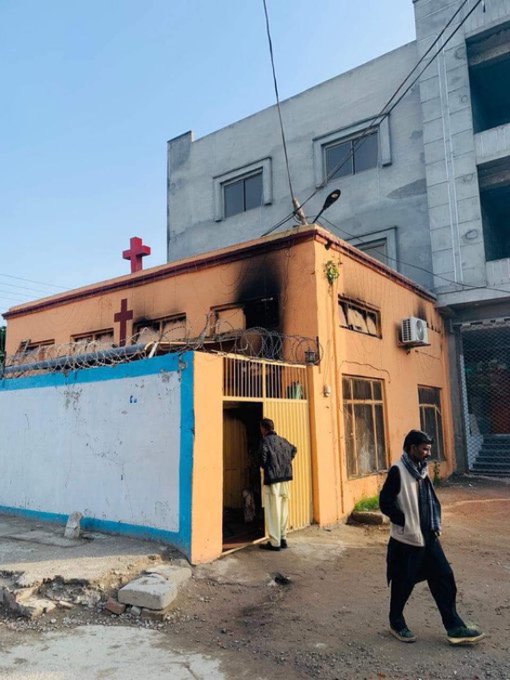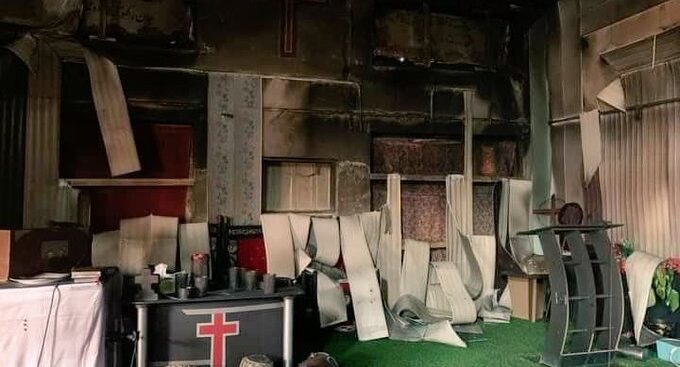Members of the Christian community suspect that a Muslim individual, who previously declared his intention to prevent them from observing Easter, orchestrated a fire believed to have been deliberately set at their place of worship on Saturday (March 30) in Rawalpindi District, Pakistan.
Reverend Adeem Alphonse of the United Presbyterian Junior Church in the Gujar Khan tehsil reported that the fire, occurring in the early hours before dawn, devastated the interior of the church’s building. “Our church fell victim to an attack around 3 a.m. on Saturday,” Reverend Alphonse stated. “A significant fire engulfed everything within the church, destroying religious texts, audio equipment, furniture, drapery, and more. We are inclined to believe this incident was an act of arson. However, authorities are downplaying the event, suggesting it was merely the result of an electrical short-circuit.”
The congregation’s suspicions are directed towards a Muslim businessman, referred to only as Sheikh Ahmed, who openly expressed his determination to disrupt their Easter service. This individual has been exerting pressure on the community to vacate the premises to facilitate the expansion of an adjacent plaza he is developing, according to Reverend Alphonse.
Ahmed disrupted the church’s Good Friday service when he attempted to dismantle the tent coverings erected outside the building, Reverend Alphonse reported. “Upon intervention by the police to prevent Ahmed from inciting further disturbances, he issued a threat to our church leaders, vowing to obstruct our Easter service at all costs, believing that the police intervention might have moderated his intentions, we proceeded with our Good Friday service. Yet, I was taken aback upon receiving a call later that evening informing me of the fire engulfing our church.”
Ahmed, who has a background in operating a construction supply business, has historically coveted the property currently leased by the church from the government, Reverend Alphonse explained. “Upon my arrival at the church, I observed firefighters actively engaged in extinguishing the blaze, supported by a substantial presence of law enforcement personnel,” stated Reverend Alphonse, who resides in Rawalpindi, located 55 kilometers (approximately 34 miles) from the church. A Muslim pharmacy proprietor, who noticed the fire, was responsible for alerting the firefighters. After the fire had been successfully extinguished, Reverend Alphonse, alongside a few church elders, discerned that the fire had originated from the wooden entrance of the main church hall.
“Everything within was destroyed,” Reverend Alphonse lamented. “Upon inspecting the electrical wiring, we found no evidence indicative of a short circuit.”
Church elder Javed Masih lodged a formal complaint with the police, identifying Ahmed as a person of interest in the incident. However, law enforcement did not mention Ahmed’s name in the initial First Information Report (FIR), which attributed the cause of the fire to an electrical short-circuit, according to Masih.

Syed Khalid Mehmood Hamdani, the City Police Officer of Rawalpindi, issued a public statement affirming that the fire resulted from an electrical malfunction. He assured that the investigation is ongoing and a comprehensive report, based on a thorough forensic analysis, will be published in due course.
The perceived preferential treatment towards Ahmed by the police sparked a demonstration among the Christian community, who are calling for an impartial and transparent inquiry into the matter.
Reverend Alphonse noted that his church serves 265 members, many of whom live under economic hardship. “Despite their limited financial means, our congregation had recently come together to finance the installation of a new ceiling and acquire a sound system for the hall, both of which were destroyed in the fire,” he stated.
The congregation initially planned to conduct their Easter service in the street as a form of protest against what they perceived as a lack of action by the police. However, they decided against this course of action following assurances from Murad Hussain Nekokara, the Assistant Commissioner of Gujar Khan, who promised a thorough investigation of the incident.
“We conducted our Easter service in the basement hall of the Jinnah Hotel,” Reverend Alphonse shared. “Initially, there was hesitation on their part to provide us with the hall due to the ongoing Muslim holy month of Ramadan, but they eventually consented. Although we managed to observe our Easter service, the loss of our church deeply saddens us, and we seek justice from the authorities.”
Adeel Rehmat, a senior figure within the Presbyterian church and the Chief Executive Officer of the Pak Mission Society, a development organization, expressed that the event had a profound impact on Christians throughout Pakistan. “Many in our community observed Easter with heavy hearts.” “The recent memory of the attacks in Jaranwala lingers, and this new tragedy has inflicted further sorrow during what should have been a joyous occasion. The administrative and law enforcement agencies must heed the legitimate grievances of the church’s leadership and ensure that those responsible are held accountable, regardless of their status or influence.”
Reverend Alphonse noted that the church edifice situated along the main Grand Trunk Highway has been a place of worship for the local Christian community since the establishment of Pakistan in 1947. “Originally, the building functioned as a Hindu temple. However, following the Partition, as the Hindu population opted to relocate to India, the Pakistani government reassigned the building for Christian use,” he explained.
Reverend Alphonse was entrusted with the pastoral leadership of the church eight years prior, succeeding his father, who had presided over the church for more than two decades. “The property is under the stewardship of the Auqaf Department of the Punjab government, and we occupy it on a lease basis,” he detailed.
On August 16, a significant incident occurred wherein over twenty church buildings and at least eighty residences belonging to Christians were devastated by Muslim groups in Jaranwala. This violent outbreak was triggered by baseless allegations against two Christian brothers, accusing them of defiling the Quran and making derogatory remarks about the Prophet Muhammad of Islam.
In response to these events, police apprehended over 300 individuals suspected of involvement in the attacks. Despite these efforts, the majority of these suspects were subsequently released on bail, attributed to flaws in the investigative process and other contributing factors, as reported by sources.
